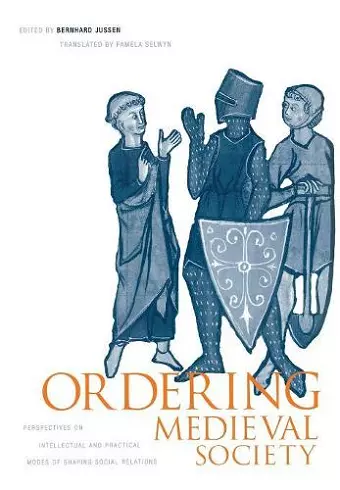Ordering Medieval Society
Perspectives on Intellectual and Practical Modes of Shaping Social Relations
Pamela E Selwyn translator Bernhard Jussen editor
Format:Hardback
Publisher:University of Pennsylvania Press
Currently unavailable, and unfortunately no date known when it will be back

"These essays challenge a once-dominant mode of German medieval studies, "constitutional history." In doing so, they reimage a more dynamic and less hierarchical Middle Ages."—Medieval Review
"These essays challenge a once-dominant mode of German medieval studies, "constitutional history." In doing so, they reimage a more dynamic and less hierarchical Middle Ages."-Medieval Review
What intellectual and practical tools did medieval peoples employ in situations of disorder? How did they attempt to maintain cultural stability? Arguing against the common notion of a static medieval society organized along kinship and feudal lines, the contributors to Ordering Medieval Society—among them some of Germany's most influential medieval historians—reveal the diverse egalitarian and hierarchical forms of organization that medieval societies used to forge group structure.
In the book's first section, "Conceiving," the authors examine intellectual modes of ordering society. They study the different patterns of social classification in the Middle Ages, including the tripartite division between clergy, knights, and peasants. The medieval system of "counting piety" through quantifiable modes of penance provided another way to define social relations. The second part, "Transforming," focuses on times of disorder when social relations were reordered at once intellectually and practically. This section analyzes the transformation of political institutions in fifth-century Gaul in a shift from a Roman to a medieval ideology. Charting a much later institutional transformation, the book provocatively argues that the concept of "the nobility" is a fourteenth-century invention. The final section, "Stabilizing," considers mechanisms for the constitution of egalitarian groups and highly developed systems for conflict resolution in medieval group culture.
Contributors: Gerd Althoff, Arnold Angenendt, Thomas Braucks, Rolf Busch, Bernhard Jussen, Thomas Lentes, Hubertus Lutterbach, Joseph Morsel, Otto Gerhard Oexle.
"An important and well-selected series of essay. They present to an English-only audience the central directions of a new kind of social history being pursued in Germany by some of the biggest names in contemporary German scholarship." * Patrick Geary, University of Notre Dame *
"This collection of essays examines the cognitive categories used by medieval people and modern historians to organize and perceive medieval society. Drawing initially on the work of medievalist Karl Schmid and secondarily on the French sociologists, these essays challenge a once-dominant mode of German medieval studies, "constitutional history." In doing so, they reimage a more dynamic and less hierarchical Middle Ages." * The Medieval Review *
ISBN: 9780812235616
Dimensions: unknown
Weight: unknown
336 pages